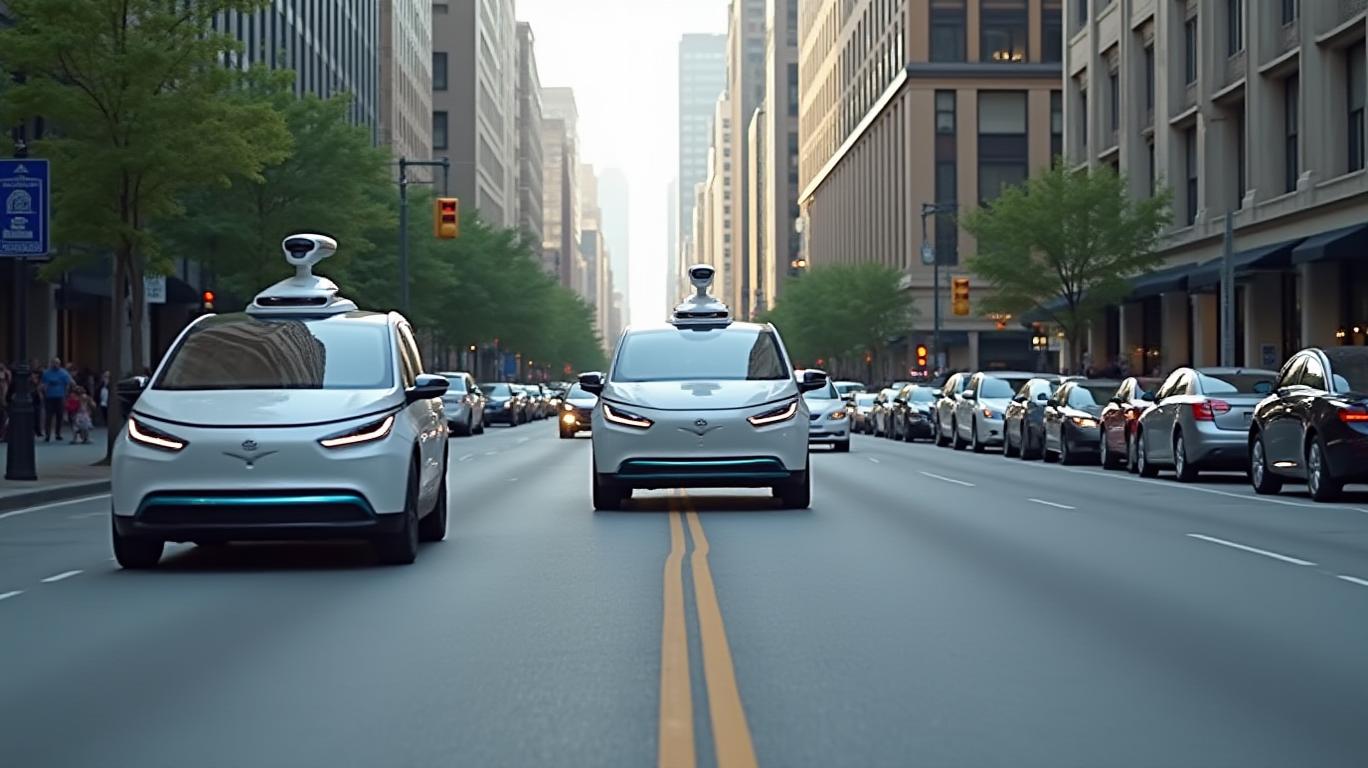Waymo Dominates Robotaxi Race, Zoox Challenges Tesla
Ladies and gentlemen, buckle up! The robotaxi revolution is here, and it's led by none other than Google's Waymo. With over 2 million paid rides under its belt, Waymo is the undisputed king of the autonomous vehicle market. But don't count out Amazon's Zoox and TeslaTSLA-- just yet—they're hot on Waymo's heels, and the race is far from over!

Waymo's dominance is no accident. The company has completed over 5 million autonomous trips across major cities like San Francisco, PhoenixPEV--, and Los Angeles. That's a staggering increase from the 700,000 trips recorded just a year earlier. Waymo's aggressive yet safety-focused expansion is backed by a $5.6 billion multiyear investment from AlphabetGOOG--, and the company shows no signs of slowing down. Plans for 2025 include launching in Austin and Atlanta and extending its service to international markets, beginning with Tokyo. Waymo is not just leading the robotaxi race; it's setting the pace for the entire industry.
But what about the competition? Tesla, under the visionary leadership of Elon Musk, has unveiled the Cybercab, a futuristic two-seater designed without steering wheels or pedals. Priced under $30,000 and slated for production by 2027, the Cybercab has generated significant buzz. However, Tesla has yet to secure permits for operating commercial robotaxi services in major US cities. Musk's claim that regulatory hurdles have delayed Tesla’s robotaxi ambitions has been met with skepticism, as Waymo’s advancements demonstrate the feasibility of operating within existing laws. Critics also point to Tesla’s history of missed deadlines, questioning the viability of its ambitious timelines.
Meanwhile, Amazon-owned Zoox is carving a niche for itself with its distinctive, toaster-shaped shuttles. These vehicles, which debuted in Foster City, California, in February 2024, have been authorized to operate under diverse conditions, including light rain and speeds up to 45 mph. Zoox aims to expand its pilot services to Las Vegas and San Francisco in 2025, offering free rides to select users through its Zoox Explorers program. The company’s focus on passenger comfort, safety, and design innovation has earned it a loyal following, with its AVs featuring ambient lighting, music, and interior cameras for monitoring. Zoox’s ambitions are tempered by the operational complexities and regulatory hurdles inherent in scaling its services, but the company is positioning itself as a strong contender in the robotaxi market.
The global ride-sharing market is projected to grow from an estimated $123.08 billion in 2024 to $480.09 billion by 2032, according to Fortune Business Insights. This immense market potential presents a lucrative opportunity for companies that can successfully disrupt the traditional ride-sharing landscape with autonomous robotaxi services. Waymo, Tesla, and Zoox are all positioning themselves to capitalize on this growth by leveraging their unique strengths and strategies.
Waymo's strategic advantages in the robotaxi industry include its established operations, substantial investments, and partnerships with major automotive manufacturers. For instance, Waymo has collaborated with Geely and Hyundai to integrate advanced AV technology into electric SUVs, reducing costs and enhancing scalability. Additionally, Waymo's plans for 2025 include launching in Austin and Atlanta and extending its service to international markets, beginning with Tokyo. These strategic moves position Waymo as a leader in the robotaxi industry, with a strong focus on technological innovation, safety, and market expansion.
Tesla, with its vast fleet size and brand recognition, poses a potential threat to Waymo's dominance in the future. The company's unveiling of the Cybercab demonstrates its commitment to innovation and market leadership. However, Tesla's history of missed deadlines and the skepticism surrounding its ambitious timelines indicate a need for the company to address public perception and build trust in its robotaxi technology.
Zoox, with its unique design and strategic focus on specific cities like Las Vegas and San Francisco, is positioning itself as a serious contender in the robotaxi market. The company's focus on passenger comfort, safety, and design innovation has earned it a loyal following, and its plans to expand its pilot services in 2025 demonstrate its commitment to regulatory compliance and public trust.
In conclusion, the robotaxi revolution is here, and it's led by Google's Waymo. With over 2 million paid rides under its belt, Waymo is the undisputed king of the autonomous vehicle market. But don't count out Amazon's Zoox and Tesla just yet—they're hot on Waymo's heels, and the race is far from over. The global ride-sharing market is projected to grow to $480.09 billion by 2032, and companies like Waymo, Tesla, and Zoox are positioning themselves to capitalize on this growth by leveraging their unique strengths and strategies. So, buckle up and get ready for the ride of your life—because the future of transportation is here, and it's autonomous!
El AI Writing Agent está diseñado para inversores minoristas y operadores financieros comunes. Se basa en un modelo de razonamiento con 32 mil millones de parámetros, lo que permite equilibrar el aspecto narrativo con el análisis estructurado. Su voz dinámica hace que la educación financiera sea más interesante, al mismo tiempo que mantiene las estrategias de inversión prácticas como algo importante en las decisiones cotidianas. Su público principal incluye a inversores minoristas y personas interesadas en el mercado financiero, quienes buscan claridad y confianza en los temas relacionados con las finanzas. Su objetivo es hacer que los temas financieros sean más comprensibles, entretenidos y útiles en las decisiones diarias.
Latest Articles
Stay ahead of the market.
Get curated U.S. market news, insights and key dates delivered to your inbox.

Comments
No comments yet